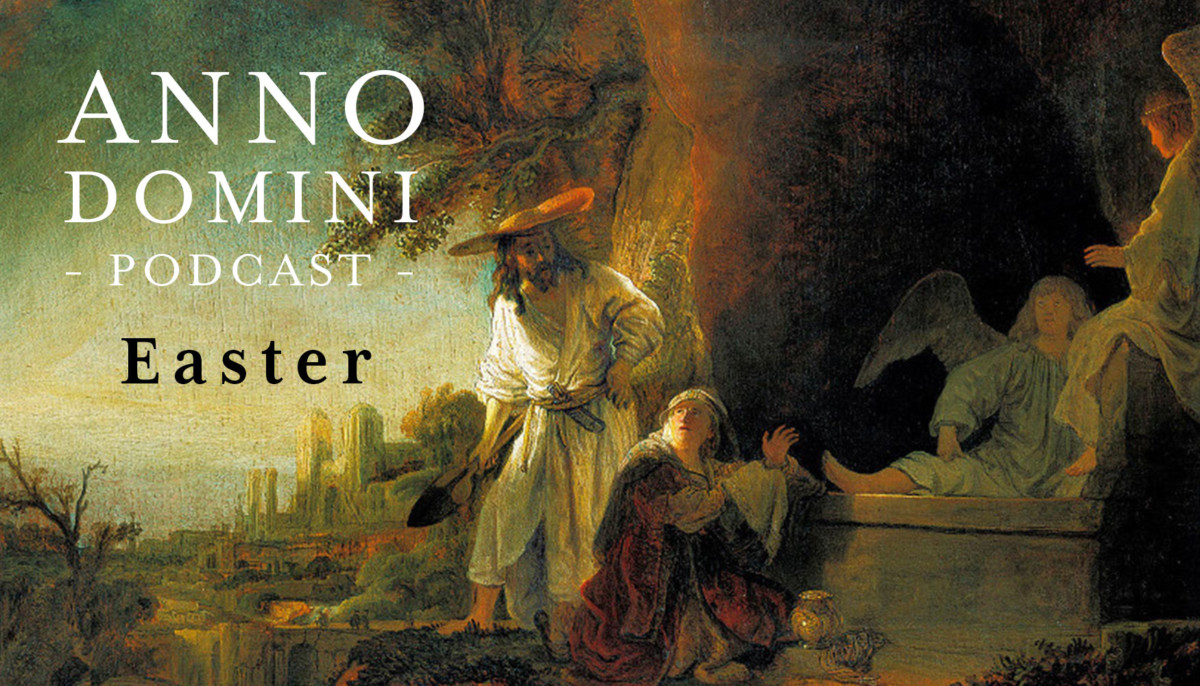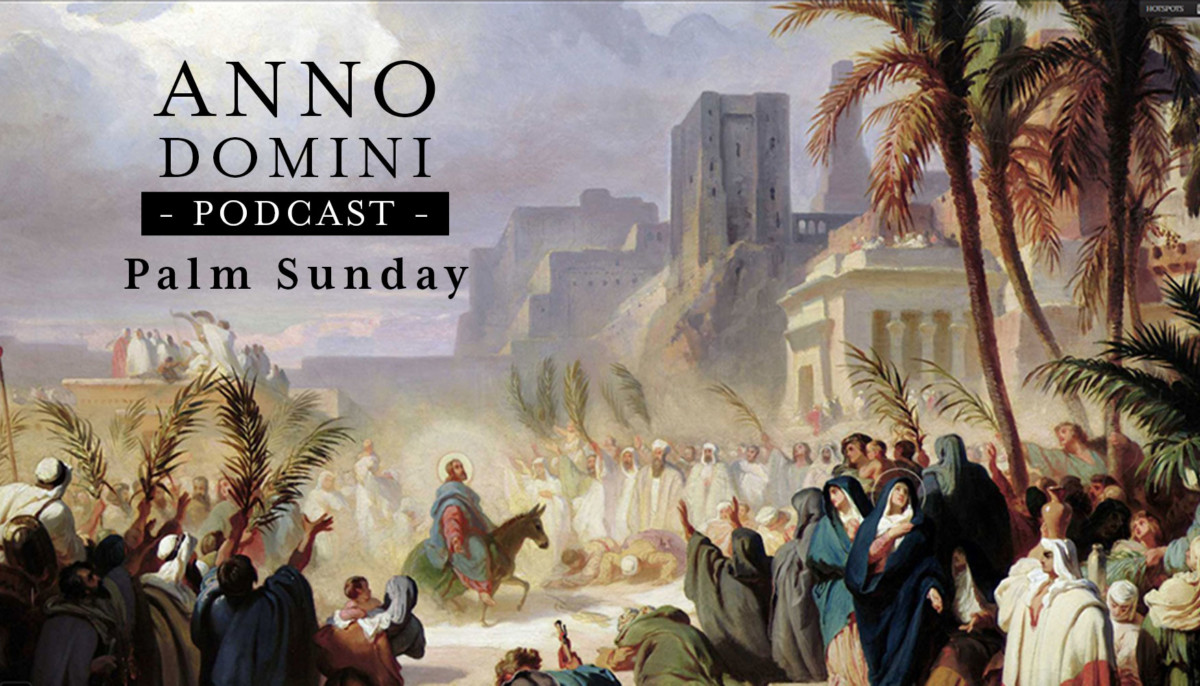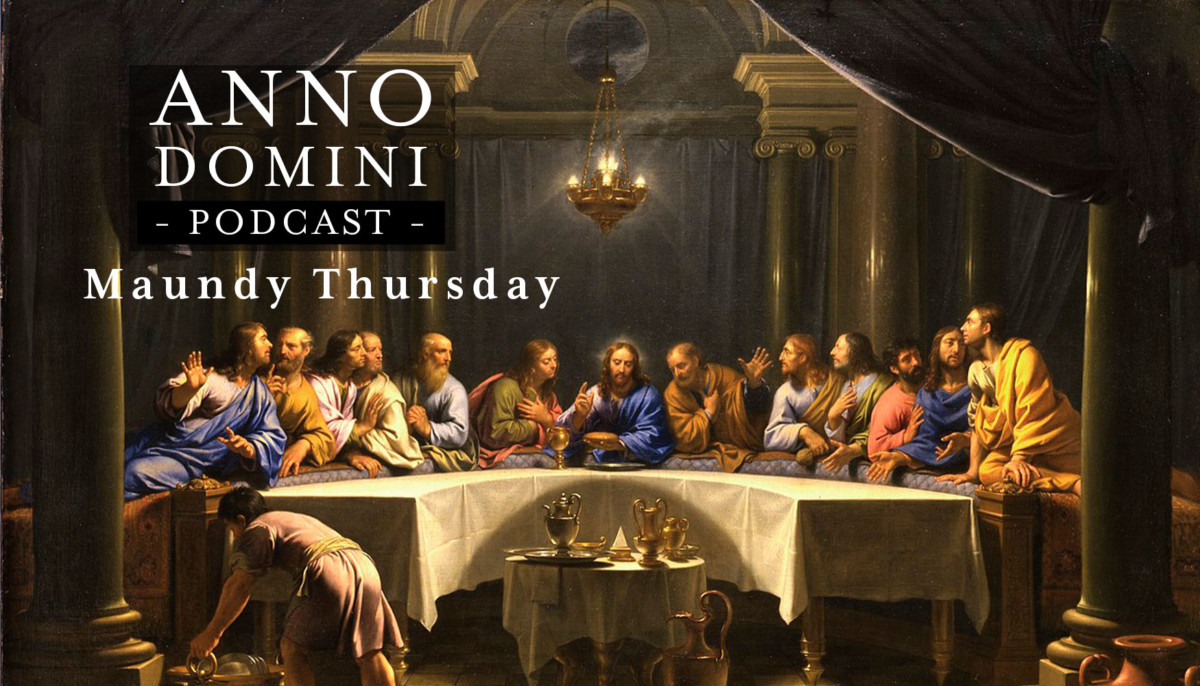"The second Sunday of Advent is here and with it there is continued eager anticipation at the coming of the Lord. This past week has been a joy for my family as we have taken each day to mark out in both small and large ways, the season of Advent. Advent is the beginning of the Church Calendar year and after Advent will come Christmastime and then Epiphany."
Text: Isaiah 11: 1-10
Hello and welcome to episode #2 of the Anno Domini Podcast. A podcast dedicated to the supremacy of Christ over all things including our days, weeks, and months.
Join me as we explore how Christ is revealed through the cyclical life of the church calendar year. We’ll discover how this calendar once structured culture and how it can again. We’ll also discuss practical ways to observe and celebrate these holy days in our quest to glorify God and live the good life in the midst of all good He has given us.
Welcome back to week 2 of our year-long journey of following the church calendar. My name is Joe Stout and I will be your host. I live in the Pacific Northwest with my lovely wife Elizabeth and our 7 soon to be 8 children. The second Sunday of Advent is here and with it there is continued eager anticipation at the coming of the Lord. This past week has been a joy for my family as we have taken each day to mark out in both small and large ways, the season of Advent. Advent is the beginning of the Church Calendar year and after Advent will come Christmastime and then Epiphany. I’d like to mention that I understand some Christians are uncomfortable with the idea of feasts days, fast days, festal and ferial days and the like. Paul certainly does not bind us to any of the days celebrated as a part of the church calendar. In fact it’s very important to note that ALL of these church calendar feasts that we discuss on the show are totally optional. We are living in the new covenant now and the only feast day that is required of us is the weekly Lord’s day Sabbath. This weekly period of celebration, feasting, and rest is the only true calendar we need and the only one we are bound by God to keep. But don’t worry, our God is so kind He blesses us with a festival every week. Truly His yoke is easy and His burden is light.
Practical
The podcast is divided into 4 sections. Practical, Biblical, Historical, and Musical. I’m thinking I’ll start with the practical because it will give a good opportunity at the beginning of the show to give a report on how things went since the last celebratory day. I’ll try and talk about the practical things my wife and children and I did to mark the season. So how did last week go? It was awesome. I love Advent because it gives Elizabeth and I the freedom to make everything a celebration. Generally we try and give actual presents on each Sunday of Advent. These are usually not huge gifts and this last week was no exception. Our kids have been totally into drinking tea. Even the 3 year old wants to have tea. He doesn’t want to actually drink the tea be he does NOT want to be left out. So this past week Elizabeth went to the goodwill and found 6 Christmas themed coffee mugs. She then filled them with bags of tea and instant coffee, the coffee was for oldest son Charles who prefers coffee to tea. We then wrapped the goody filled mugs up and gave them to the kids during our Advent liturgy that way they could actually have tea while we celebrated.
During the week we focus the kids attention on experiences together as times of celebrations. On monday there was a free orchestra concert that my mother-in-law took the kids too. Advent celebration. On Tuesday we went out and had pizza with everyone. Advent celebration. On Wednesday, our dear friends from Spokane sent us some incredible radio dramas so we passed them onto our children during the day. Advent Celebration. Just today, Elizabeth came home from a doctors appt. and brought each of the kids a 33¢ ruler from the dollar store. This doesn’t have to be complicated. Managing expectation in your kids is and teaching them to be excited and thankful for a 33¢ ruler is one of the keys to a happy home.
Biblical
Let’s move from the practical application of celebrating Advent into the biblical passage. This weeks biblical text as it relates to the Second Sunday of Advent comes from Isaiah 11 verses 1-10
Isaiah 11:1-10
There shall come forth a shoot from the stump of Jesse,
and a branch from his roots shall bear fruit.
And the Spirit of the Lord shall rest upon him,
the Spirit of wisdom and understanding,
the Spirit of counsel and might,
the Spirit of knowledge and the fear of the Lord.
And his delight shall be in the fear of the Lord.
He shall not judge by what his eyes see,
or decide disputes by what his ears hear,
but with righteousness he shall judge the poor,
and decide with equity for the meek of the earth;
and he shall strike the earth with the rod of his mouth,
and with the breath of his lips he shall kill the wicked.
Righteousness shall be the belt of his waist,
and faithfulness the belt of his loins.
The wolf shall dwell with the lamb,
and the leopard shall lie down with the young goat,
and the calf and the lion and the fattened calf together;
and a little child shall lead them.
The cow and the bear shall graze;
their young shall lie down together;
and the lion shall eat straw like the ox.
The nursing child shall play over the hole of the cobra,
and the weaned child shall put his hand on the adder's den.
They shall not hurt or destroy
in all my holy mountain;
for the earth shall be full of the knowledge of the Lord
as the waters cover the sea.
In that day the root of Jesse, who shall stand as a signal for the peoples—of him shall the nations inquire, and his resting place shall be glorious.
In this passage a prophecy is foretold about the coming of life from the stump of Jesse. Even though this is only a stump, presumably dead from constant unbelief, there is new life in it. There will be a branch, a Root of Jesse, that will come and when He comes he will have the Spirit of wisdom and understanding and counsel and might and knowledge and a fear of the Lord. In fact we are told that His delight will be in the fear of the Lord. He will come in judgement. But not man’s judgement. Man must necessarily judge by what he sees and what he hears. Man does not have the ability to see the heart as God does. But this branch, this branch from the dead stump of Jesse won’t judge like we do, He will judge with righteousness and equity and will be a friend to the poor and the meek.
Now let’s stop here and talk about judgement. Often we hear the word judgement and our minds picture a crazy eyed man in a sandwich board that reads Judgement is Coming in drippy black letters. In other words we think of judgement as scary sounding. And it’s true that for the wicked, judgement is scary. Isaiah promises that this Root of Jesse will strike the earth with his mouth and will kill the wicked with His breath of His lips. It is a fearful thing to fall into the hands of a living God. But for God’s people, for those who claim Christ as their King, judgement is the exact opposite. Righteous judgement is something we yearn for and long to see fulfilled. Why do we look for judgement? Look what happens after the king comes and judges righteously. Wild and dangerous animals become tame. Frail children can lead the strongest of beasts. Venomous snakes loose their bite of death. Bears, lions, and carnivorous predators cease their endless killing and return to life as it once was in the garden…a life free from death all together. In fact we are promised that as this glorious truth grows, as yeast might mysteriously expand throughout a loaf of bread, we are promised that one day the
“the earth shall be full of the knowledge of the Lord as the waters cover the sea.”and that Root of Jesse (Jesus) shall stand as a signal for the peoples, that all the nations will inquire about him, and in Him they will find their rest. Now that day has not yet arrived in its fullness but I am here to tell you that the reality and means of fulfillment of that future has in fact come. I think we miss the point altogether if we don’t see that the fulfillment of this prophecy began when Jesus came to us in Bethlehem. Matthew 4:16 reads:
"the people dwelling in darkness
have seen a great light,
and for those dwelling in the region and shadow of death,
on them a light has dawned.”
We were those people dwelling in darkness and the shadow of death and then Jesus came and now a light has dawned. Are we going to ignore that glorious truth the next time we hear about some natural disaster, war, or other physical manifestation of sin? Are we going to miss the fact that Christ has already come and has set and is setting things right? That right now He is reigning until all of His enemies have been set under His feet and then when only one enemy remains, that of death itself, He will return and crush the final enemy and death itself will be swallowed up in victory.
Historical
Now for some historical context. How does Isaiah 5 from last week and now Isaiah 11 this week fit in with the nativity? With the coming of Christmas? Is there any connection or am I just grabbing biblical texts at random. These readings are not at all random and in fact they are highly relevant to the coming of Christ. These readings came from something called a lectionary. A lectionary is simply a prepared set of readings that are connected in a germane way to the day or week of the Church Calendar. Usually there is an Old Testament Reading, A Psalm, a Gospel passage, and an Epistle reading. These passages usually share commonalities although sometimes you have to work to spot them. So one of the passages for the Second Sunday of Advent was Isaiah 11:1-10 but I didn’t get a chance to read or talk about Psalm 72 or Romans 15 or Matthew 3 all passages that are obviously or not so obviously connected by the common theme surrounding the good news of the coming judgement of Christ. I will have a link to the lectionary I will be pulling from in the show notes. Now it's hard to find a lot of concrete information on the history of this lectionary but the very biblically faithful Missouri Synod branch of the Lutheran Church says that this lectionary has been in use in various forms since the 4th century. Think about that. For at least 1600 years, Christians have been reading these passages, I’m sure with plenty of variations, during the different seasons of the church calendar. Now that means of course that we have centuries of thought, theology, and purpose behind these biblical pairings. This really ought to be a blessing to us. It reminds me that we’re not alone in this. We have a great cloud of witnesses that have gone before us and have paved the way in many areas, how to structure our bible reading being just one of them. So check out the link to the Lectionary. It is a 3 year lectionary so this series of readings won’t be seen again for another 4 years.
Musical
This is the part of the show where we take an ancient hymn and probe the incredible theological depths of our forefathers in the faith. This weeks hymn comes again from the 4th century. This time the poet’s name is Aurelius Clemens Prudentius who wrote a poem which was translated into the hymn we call
Of the Father’s Love Begotten. The poem was translated in 1851 and set to the plainchant tune known as Divinum Mysterium. I’ve changed the tune entirely for the first 5 verses of the version I will be sharing with you today but in the 6th and 7th stanzas of the hymn this theme is revealed. Let’s look at the words.
- Of the Father's love begotten,
Ere the worlds began to be,
He is Alpha and Omega,
He the source, the ending He,
Of the things that are, that have been,
And that future years shall see,
Evermore and evermore!
- At His Word the worlds were framed;
He commanded; it was done:
Heaven and earth and depths of ocean
In their threefold order one;
All that grows beneath the shining
Of the moon and burning sun,
Evermore and evermore!
- He is found in human fashion,
Death and sorrow here to know,
That the race of Adam's children
Doomed by law to endless woe,
May not henceforth die and perish
In the dreadful gulf below,
Evermore and evermore!
- O that birth forever blessèd,
When the virgin, full of grace,
By the Holy Ghost conceiving,
Bore the Saviour of our race;
And the Babe, the world's Redeemer,
First revealed His sacred face,
evermore and evermore!
- This is He Whom seers in old time
Chanted of with one accord;
Whom the voices of the prophets
Promised in their faithful word;
Now He shines, the long expected,
Let creation praise its Lord,
Evermore and evermore!
- O ye heights of heaven adore Him;
Angel hosts, His praises sing;
Powers, dominions, bow before Him,
and extol our God and King!
Let no tongue on earth be silent,
Every voice in concert sing,
Evermore and evermore!
- Christ, to Thee with God the Father,
And, O Holy Ghost, to Thee,
Hymn and chant with high thanksgiving,
And unwearied praises be:
Honor, glory, and dominion,
And eternal victory,
Evermore and evermore!
Verse 1 starts by describing Christ as being before the world began. Christ is the beginning and end. The alpha and omega. He is the Source from whom all life flows and is the fulfillment for all things that are, that have been, and that will come evermore.
Verse 2 vividly narrates the beginning of the world. God created from the power of His voice. He created with nothing else but a command and it was done. Heaven, earth, and the ocean, a trinity of sorts of creation were put in order by His voice. Everything that grows under the sun and moon was created by Him.
Verse 3 gives an account of the historical Jesus. The Christ in human form or fashion. He knew both death and sorrow while He lived with us but did so because this race of Adam’s children, doomed by the law to death, would not perish in the gulf between God and man.
Verse 4 proclaims the glories of the blessed birth from the virgin who was God’s receiver of grace. The Holy Ghost conceived in her the Savior of the human race. When that babe, the Christ child, first revealed his sacred face, the world was never again the same.
Verse 5 describes both the prophecies regarding Christ by the Old Testament prophets, here called seers in old time. They chanted or repeated in agreement the coming of messiah. And now this Christ has ascended unto the Father and is reigning in glory so let creation praise it’s Lord.
Verse 6 which is back in the original plainchant expresses the truth of Romans 1 which is that all creation adores Christ. The truth of Hebrew that Christ is superior to the angels. The truth of Philipians 2:10 that all will bow before him including the powers and dominions of today. These all will bow before Him and extol Him as God and King. The verse concludes that no tongue should be silent but everyone should, in concert, or together sing unto him.
Verse 7 finishes the hymn by giving glory to the triune nature of God. Christ to thee with God the Father, and O Holy Ghost to Thee. What should our response be to this triune God? Hymn, chant with thankgiving. The true mark of a Christian. Don’t grow weary in praising Him because Honor, glory, and dominion, and eternal victory belong to Christ for evermore, evermore, amen.
And with that I will finish this podcast by playing a brand new version of the Ancient Hymn Of the Father’s Love Begotten. This is going to be track 2 on the upcoming Album simply called “Advent.” which I had hoped would be released this week but it is looking like it will have to be next week. Stay tuned.
I hope everyone has a blessed second Sunday of Advent and I will see you all next week.


